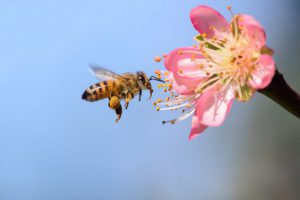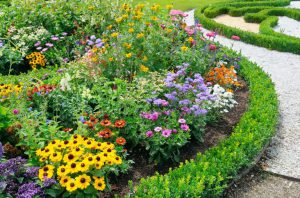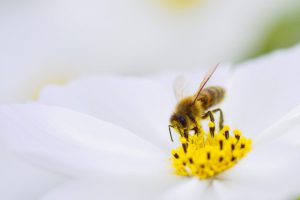What’s All The Buzz About Bees?
To put it bluntly: Without bees, there would be no food.
Bees are the foundation of the human food chain, and despite their seemingly scary outward appearance, these little insects are the backbone of a huge majority of our food production.
Fruits? Vegetables? Nuts? Flowers?
All thanks to bees.
Learn all about bees in this blog so that you can be more aware of how they make a tremendous impact on our lives.
BEES & POLLINATION

What is pollination? It’s basically plant reproduction, and while some plants are able to pollinate themselves or rely on the wind, a large majority of plants rely on bees.
And if bees weren’t around anymore, our food supply would change drastically, and we wouldn’t have nearly as many foods as we currently have now.
WHAT FOODS WOULD WE LOSE, IF WE LOST BEES?
- Broccoli
- Asparagus
- Cantaloupe
- Cucumber
- Pumpkin
- Blueberries
- Watermelon
- Almonds
- Apples
BEES & BEAUTY

In the process of keeping flowers pollinated and healthy, bees initiate floral growth and increase the beauty of our planet.
Bees are easily one of the most important insects on the planet, and deserve a big pat on the back for providing us with delicious fruits, vegetables, honey, and beautiful flowering gardens.
HOW YOU CAN CREATE A BEE-FRIENDLY YARD

- Choose plants that attract bees – Bees are attracted to native wildflowers, herbs, berries, and flowering fruits and vegetables. By planting things they love, you will see an abundance of these striped insects pollinating away in your yard in no time.
- Pick plants with long blooming cycles – The bigger the bloom, the more bees will be attracted to them. And the longer your plants will be blooming, the longer bees will stick around to pollinate.
- Provide a fresh water source – Areas like ponds, bird baths, or any other shallow water source with items for bees to stand on will work.
- Refrain from using chemicals in your garden – Pesticides and herbicides may seem like a great idea at first, but once you realize they often do more harm than good, you’ll quickly change your mind. These chemicals are toxic to bees and have been known to be detrimental to plants.
- Not all weeds are bad – Bees love flowering weeds like dandelions and clovers, and they are vital for their survival. Let them grow and flower in your yard and you will soon have your very own bee sanctuary.
FUN FACTS ABOUT BEES
- Bees pollinate 80% of flowering plants on earth
- One bee colony can pollinate 300 million flowers every day
- Bees pollinate 70 of the top 100 human food crops
- 1 in 3 bites of food we eat is derived from plants pollinated by bees
- Almonds are totally dependent on bee pollination, and without bees, there would be no almonds
- Honey is unique to bees, and without bees, there would be no honey
- Bees have been producing honey from flowering plants for 10-20 million years
CONTACT US!
If you would like to learn more about how you can incorporate bee-friendly gardens into your landscaping, contact us!
- WHY TRUST IS SO IMPORTANT TO US - December 15, 2019
- MORE ON LANDSCAPE LIGHTING - February 16, 2019
- 5 Ways Landscaping Can Increase Your Home Value - January 5, 2019
